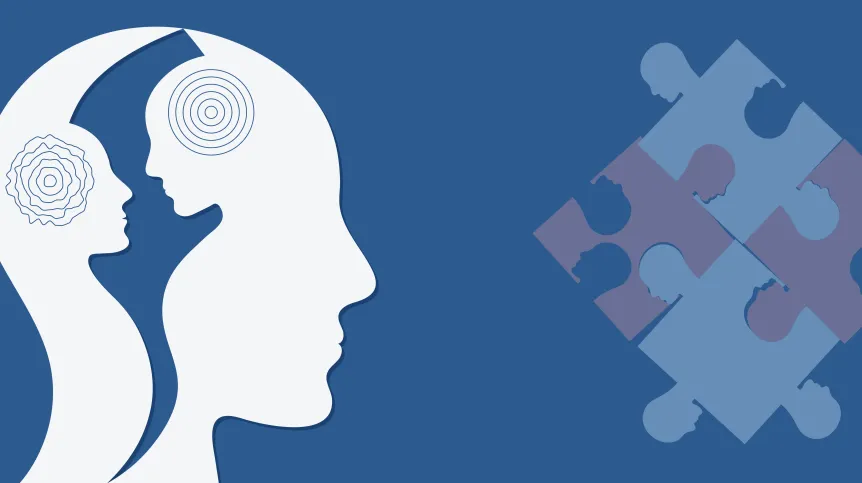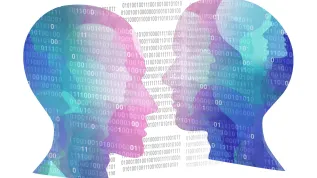
Jumping to conclusions, seeing signs where there are none, and attributing internal experiences to the outside world are among the cognitive biases that make living with schizophrenia difficult. These can be addressed through metacognitive training (MCT), explains psychologist Łukasz Gawęda, PhD, a professor at the Institute of Psychology of the Polish Academy of Sciences.
Gawęda studies how MCT affects people with schizophrenia. The therapy, he says, is “based on the assumption that thinking errors, or cognitive distortions, are behind psychotic symptoms such as delusions, hallucinations, and negative symptoms.”
“The therapy involves working with these distortions. We try to decrease their intensity,” he explains in an interview with PAP.
According to Gawęda, “Schizophrenia is not a ‘complete detachment from reality’ or some incomprehensible ‘madness’. It is rather an intensification of experiences that, on a smaller scale, each of us experiences.”
He adds that healthy people sometimes also “feel as if someone is looking at them strangely, or confuse dreams and reality.”
“We are all at some point on the same continuum,” he says. “The problem begins when these interpretations become a source of suffering and lead to the belief that the world is threatening and people are hostile.”
Understanding these mechanisms, he notes, allows “greater kindness and empathy towards people with schizophrenia.” Since “we are working on the same, universal mechanisms of assigning meaning,” psychotherapy can “modify cognitive biases and reduce suffering.”
TYPES OF COGNITIVE BIASES IN SCHIZOPHRENIA
People with schizophrenia often display several cognitive biases. One is jumping to conclusions based on little evidence—such as thinking, “if a car drives behind me, it means it is following me.” Another is assigning meaning to neutral events. “Psychosis is sometimes referred to as excessive meaning-making syndrome,” Gawęda says. “The brain… assigns excessive weight and significance to neutral or irrelevant stimuli. This, in turn, leads to the development of delusions.”
Patients may also ignore counterevidence or struggle with source monitoring, confusing imagination with reality. This can cause external attribution of thoughts—believing “someone is sending me thoughts” or “speaking through my mouth.”
Other distortions include hypermentalisation—overanalyzing others’ intentions—and catastrophising or overgeneralisation, such as believing, “if I was followed once, I’ll be followed forever.”
DRUGS AND PSYCHOTHERAPY
Gawęda says medication helps by reducing the brain’s “overemphasis effect,” the tendency to assign undue importance to neutral stimuli. “Medications make patients less concerned about these signs and less motivated to ‘dig into the subject,’ consequently, they are less absorbed with delusional content,” he notes. But symptoms persist in about a third of patients.
Even when drugs work, “they do not change the underlying beliefs or thought patterns,” he adds. “A patient may still believe the world is threatening, but after taking medication, they will say, ‘I do not care so much now.’ That is why psychotherapy is necessary.”
The goal of MCT is to build awareness of one’s thought processes. “First, we show the patient that such thinking can lead to emotional problems. The second step is teaching them how to avoid these thinking traps,” Gawęda explains.
Through questioning automatic thoughts (“everyone on the tram is watching me”) and considering alternative explanations, patients can reduce anxiety and regain control. “This process is often difficult at first, but systematic work in therapy or meta-cognitive training helps overcome these difficulties,” he says.
MCT typically involves 10 sessions over five weeks, individually or in groups. “Its effectiveness, especially in reducing delusional beliefs, is confirmed by research,” Gawęda emphasises.
POOR ACCESSIBILITY
Gawęda criticises the limited access to psychotherapy in Poland. “The standard treatment for schizophrenia in Poland is still ‘pharmacological therapy, pharmacological therapy, pharmacological therapy – and then nothing,’” he says.
“We need to ‘debiologise’ our thinking about schizophrenia and understand that psychotherapy, acting on the brain through words and learning new habits, is an equally important intervention,” he adds.
Convincing patients to join therapy can be difficult, he admits: “Delusions often encompass the entire world, so the therapist can also be treated as part of an oppressive system. Schizophrenia can even be called a ‘global loss of trust.’ Therefore, building a safe and trusting therapeutic relationship is absolutely crucial.”
“Once such a relationship is established, therapy can truly bring positive results,” Gawęda concludes.
Gawęda studies the effectiveness of MCT as part of an international research consortium involving Spain, France, Germany, Chile, and Poland (permepsy.org). The Polish team’s work is supported by the National Centre for Research and Development.
PAP - Science in Poland, Ludwika Tomala (PAP)
lt/ zan/ bar/ lm/ kap/
tr. RL













